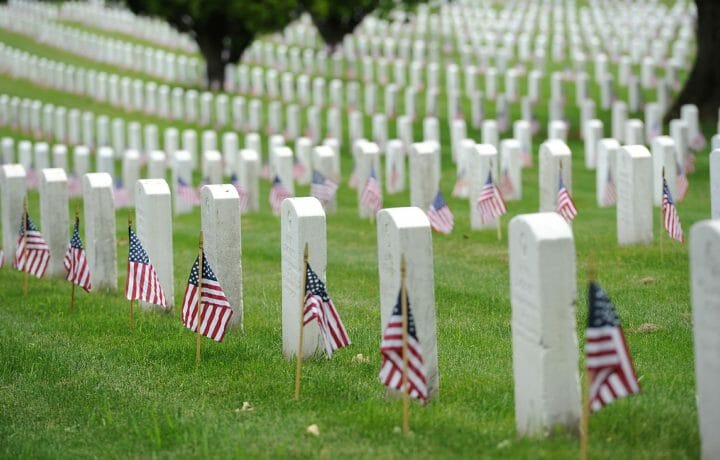Memorial Day, which I have taken to calling “our most sacred secular holiday,” is a day of mixed emotions for me and many other veterans. For many years, it was a day of deep depression. But I no longer feel that way, as much as my wife and children still prepare themselves for dad to be “in a mood.”
Growing up in the small town of Groton, MA, Memorial Day was always special. Since settlers first put down roots there in 1655, town has paid a higher war price than may towns of its size, and continues to experience war. Three residents—Peter and Sue Kim Hansen and their three-year-old daughter Christine—were passengers on United Airlines Flight 175, the second plane to crash into the World Trade Center on 9/11. Christine was the youngest victim of 9/11. Four residents have died in Iraq and Afghanistan.
Memorial Day in Groton is still the day of the big parade, led by the local American Legion post. Bands, Boy Scout and Girl Scout troops, our local “Minuteman” company, and various civic groups march down Main Street, heading for the the town cemetery, where people grow suddenly quiet, the drums muffled.
On a hilltop called “The Mound,” sits a memorial to the townsmen who have died, with the exception of Desert Storm, in every American war since the Revolution. Prayers are said and flowers laid. A bugler plays taps. Sometimes a band plays the “Star Spangled Banner,” sometimes the high school chorus sings it. An honor guard fires the traditional three volleys.
Through my teenage years, following the parade my family did what so many across the nation do on this day: we hosted a cookout. For a while after 9/11, I questioned that tradition, wondering if we had really given Memorial Day the reverence it deserved. Were we really taking the time to reflect on “the blessings of liberty” we enjoyed only through the sacrifice of our honored war dead?
As the years have passed, I have come to realize that Memorial Day need not be a day of mourning. While the cynics question what strategic interest we serve by remaining engaged in Afghanistan almost 18 years later, I do not. I firmly believe that a secure, stable, self-sufficient Afghanistan is vital to national security. Those who continue to give their lives there do so to preserve the American way of life as much as the men who died on the fields of Gettysburg or the beaches of Normandy.
And individual liberty, the heart of that way of life, means being free to observe any holiday however you see fit.
These days, I ask (but don’t demand) just three things of people on the last Monday in May. First, don’t thank me for my service There are other days for that. Second, don’t wish me a “happy” Memorial Day. I’ll still be in a somber mood. And third, please, if it’s not too much trouble, take one moment of your day to reflect on the generations of sacrifice that made your holiday possible. Everything else is up to you.
I can think of no better way to honor those who gave what Abraham Lincoln called “the last full measure of devotion” than to spend the day with friends and family, just being Americans. Our fallen made that possible. For my part, I’ll be lighting a cigar, pouring a glass of scotch, and toasting absent comrades. Then I’ll put some burgers on the grill and just be another American appreciating a long weekend.
You do it however you think is best. It’s your right.




